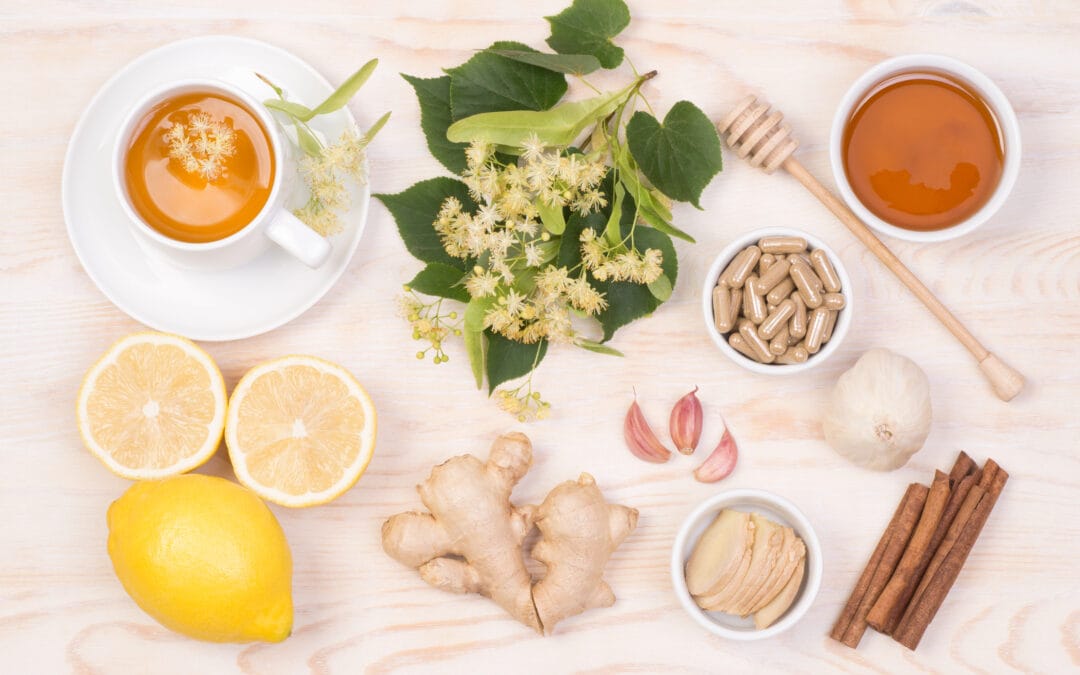No matter how hard you try to prevent winter colds, sometimes one determined little virus infects you. However, you are not powerless. During this time of year, be prepared with various home remedies for colds and flu. Having everything you need on hand can help reduce your symptoms and may even shorten the duration of a virus. The following remedies are in three groups: nutrients, foods, and lifestyle practices.
Home Remedy Nutrients
ZINC—Consider zinc lozenges at the first sign of a sore throat or other cold symptoms. A 2017 review of studies1 showed that zinc lozenges may help reduce the length of a cold by 33-40%. The dosages in the study were between 80 and 92 mg. Higher daily dosages had no additional benefit. Lozenges sweetened with organic cane sugar are best since some sugar alcohol sweeteners may impair absorption.
VITAMIN C—Randomized, double-blind trials2 have shown that Vitamin C shortens the duration of a common cold virus. Compared to a placebo, vitamin C also significantly decreased the severity of a cold by 15%. Most of these studies used a dosage of 1000 mg daily. What’s important to remember with vitamin C is that the body can absorb only 200-500 mg per hour. So, taking vitamin C in lower doses more frequently during the day is better than one large dose.
PROBIOTICS—A systematic review3 of randomized controlled trials (RCTs) from January 2010 to January 2020 found that probiotics could increase plasma cytokines, reduce virus titers (concentration), improve quality of life, and reduce the incidence and duration of respiratory infections. The study also concluded that the antiviral and immune-modulating properties of probiotics may help prevent and manage viral infections.
ELDERBERRY—Elderberries have antibacterial and antiviral activities. Two clinical trials4 using a liquid elderberry extract called Sambucol® showed reduced flu symptoms and duration. A study with elderberry extract lozenges also showed a beneficial effect on the severity and duration of cold and flu-like symptoms.5
Home Remedy Foods and Spices
CHICKEN SOUP—Research has shown that chicken soup increases mucus flow and helps the body eliminate the cold virus more than other hot liquids.6 Chicken is rich in cysteine, which helps loosen secretions. Adding spices such as pepper and garlic can increase this effect. Other immune-boosting soups made with homemade chicken stock may also be beneficial.
GINGER—Ginger has a long history of being used as a medicinal plant.7 Studies show it helps improve insulin sensitivity and has antioxidant and anti-inflammatory properties. It’s a well-known anti-nausea remedy that benefits the digestive system. Ginger is also effective at killing cold and flu viruses.8 Use raw ginger in smoothies and soups, or brew ginger tea.
GARLIC—One study9 found that participants who took garlic daily had fewer colds than participants who received placebos. Garlic has been widely studied for its anti-inflammatory and immunomodulatory properties, which are highly beneficial for the immune system.10
HONEY—Honey has historically been valued for its medicinal properties, especially in managing symptoms of colds, flu, and sore throats. Research has shown that its antimicrobial and antiviral properties can soothe sore throats and reduce coughing, outperforming many common over-the-counter cough suppressants.11 Honey helps decrease throat inflammation and irritation and can be used for wet and dry coughs. It may also help decrease mucus secretion. However, it’s important to avoid giving honey to children under age one due to the risk of botulism.
TEA—Herbal teas contain different plant compounds that can help with inflammation, support the immune system, and relieve a sore throat. The best teas for fighting a winter virus include ginger, chamomile, echinacea, elderberry, peppermint, lemon, and slippery elm. Green tea is also beneficial and may even help prevent a cold.12 Consider making winter smoothies with cooled, brewed green tea instead of water.
Home Remedy Lifestyle Practices
SLEEP—When you’re dealing with any winter virus, it’s important to stay home, rest, and get plenty of sleep. Certain immune processes occur during sleep, giving your body time to repair itself. Fighting an illness also takes a lot of energy, so rest completely.
LIQUID DAY—Since over 70% of immune activity happens in the digestive tract, consider a full liquid diet for a day or two to give your digestive system a break. Power up with soups, healing teas, green juice, and coconut water to maintain hydration and electrolyte balance.
WARM BATH—A warm (not hot) bath may help reduce cold and flu symptoms. Add Epsom salt and baking soda to the water to reduce body aches. To relieve nasal congestion, you can also add essential oils, such as eucalyptus, peppermint, and lemongrass.
NASAL IRRIGATION—Nasal Irrigation– Studies have shown that this tradition, originating in Ayurvedic medicine, can improve symptoms in 35% of cases.13 Several international consensus conferences now recommend saline nasal irrigation for several sinus conditions, including the common cold.
SALT WATER GARGLE—Dissolve one teaspoon of unrefined sea salt in a full glass of water and swish it around your mouth and throat before spitting it out. A saltwater gargle can reduce and loosen mucus and decrease the severity of cold symptoms.
Lastly, don’t beat yourself up by saying, “Why did I get sick?” Even people following every healthy lifestyle and food practice can catch what’s going around. Stress is often an overlooked factor in becoming ill. However, getting a cold or flu once a year is perfectly healthy. Consider it exercise for your immune system.
As you enter a new year, consider creating a health journal and note any illnesses, injuries, or other health challenges during the year so you have a record. Detail your symptoms daily and note how quickly you recovered and what home remedies you followed.
Sanoviv wishes you a happy and healthy new year!
REFERENCES
- Hemilä H. Zinc lozenges and the common cold: a meta-analysis comparing zinc acetate and zinc gluconate, and the role of zinc dosage. JRSM Open. 2017 May 2;8(5):2054270417694291.
- Hemilä, H., Chalker, E. Vitamin C reduces the severity of common colds: a meta-analysis. BMC Public Health 23, 2468 (2023).
- Atieh Darbandi, Arezoo Asadi, Roya Ghanavati, Roghayeh Afifirad, Amir Darb Emamie, Maryam kakanj, Malihe Talebi, The effect of probiotics on respiratory tract infection with special emphasis on COVID-19: Systemic review 2010–20, International Journal of Infectious Diseases, Volume 105, 2021, Pages 91-104, ISSN 1201-971
- Vlachojannis J.E., Cameron M., Chrubasik S. A systematic review on the sambuci fructus effect and efficacy profiles. Phytother. Res. 2010;24:1–8. doi: 10.1002/ptr.2729.
- Kong F. Pilot clinical study on a proprietary elderberry extract: Efficacy in addressing influenza symptoms. Online J. Pharmacol. Pharmacokinet. 2009;5:32–43.
- Saketkhoo, Kiumars et al. Effects of Drinking Hot Water, Cold Water, and Chicken Soup on Nasal Mucus Velocity and Nasal Airflow Resistance, CHEST, Volume 74, Issue 4, 408 – 410, October 1978
- Anh NH, Kim SJ, Long NP, Min JE, Yoon YC, Lee EG, Kim M, Kim TJ, Yang YY, Son EY, Yoon SJ, Diem NC, Kim HM, Kwon SW. Ginger on Human Health: A Comprehensive Systematic Review of 109 Randomized Controlled Trials. Nutrients. 2020 Jan 6;12(1):157.
- Chang JS, Wang KC, Yeh CF, Shieh DE, Chiang LC. Fresh ginger (Zingiber officinale) has antiviral activity against human respiratory syncytial virus in human respiratory tract cell lines. J Ethnopharmacol. 2013 Jan 9;145(1):146-51.
- Lissiman E, Bhasale AL, Cohen M. Garlic for the common cold. Cochrane Database Syst Rev. 2014 Nov 11;2014(11):CD006206.
- Arreola R, Quintero-Fabián S, López-Roa RI, Flores-Gutiérrez EO, Reyes-Grajeda JP, Carrera-Quintanar L, Ortuño-Sahagún D. Immunomodulation and anti-inflammatory effects of garlic compounds. J Immunol Res. 2015;2015:401630.
- Oduwole O, Udoh EE, Oyo-Ita A, Meremikwu MM. Honey for acute cough in children. Cochrane Database Syst Rev. 2018 Apr 10;4(4):CD007094.
- Furushima D, Ide K, Yamada H. Effect of Tea Catechins on Influenza Infection and the Common Cold with a Focus on Epidemiological/Clinical Studies. Molecules. 2018 Jul 20;23(7):1795.
- K.E. Hermelingmeier, R.K. Weber, M.Hellmich, C.P. Heubach, R. Mösges, Nasal irrigation as an adjunctive treatment in allergic rhinitis: a systematic review and meta-analysis, Am J Rhinol Allergy, 26 (2012), pp. e119-e125

